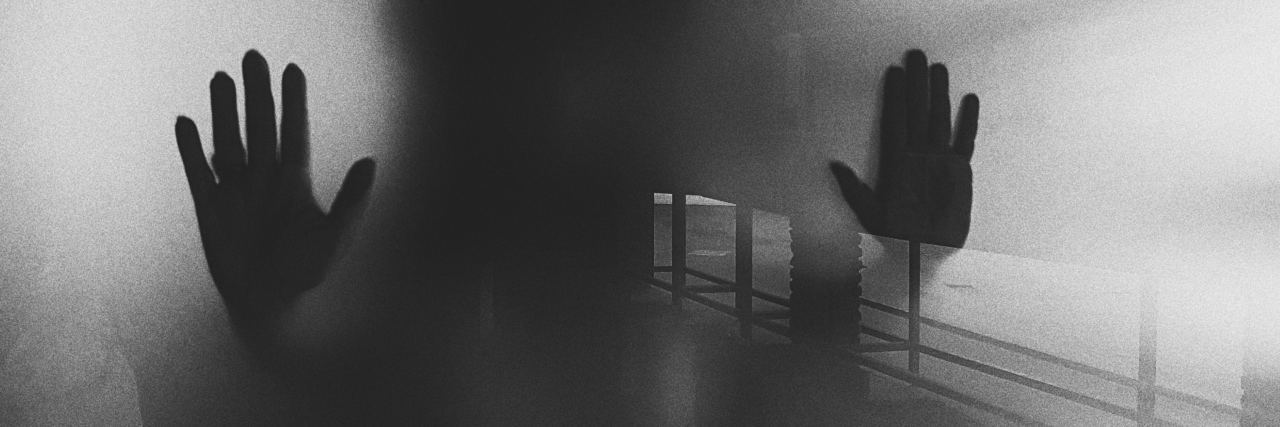The Ghosts That Inpatient Mental Health Care Must Continue to Face
Editor's Note
If you or a loved one is affected by addiction, the following post could be triggering. You can contact SAMHSA’s hotline at 1-800-662-4357.
I was taken to a cramped white room and told to take off all of my clothes. She left as I did as I was told. When she returned, she probed my naked body.
“OK, now I need you to stand with your feet far apart. I have to examine your genitals to make sure you aren’t bringing in drugs and weapons. Sorry, I’ll make it quick.”
It didn’t feel quick.
I was given a rundown of the rules: No cell phone, no computer, no internet access, calls only for a couple hours a day from people who have a password, visits only for an hour on weekends. I was to stay on the locked unit at all times unless I earned the rare privilege to go in the garden. Every minute strictly scheduled, strictly supervised — yes, even using the restroom. Every meal, minute slept and action recorded.
Such was my introduction to mental health care, and inpatient hospitalization, at 14 years old.
As I was lead to the room I’d be sleeping in, we passed the day room, where I would spend most of my time. All of the chairs were hard. As we continued, I was struck by blocks of red and yellow paint on the hallway walls, out of sync with the sea of sterile whites. When I got to my room, I sat on the bed. It was a rock, and the nurse handed me a sandpaper blanket and socks.
The worst counselor was a snapping turtle. He hissed at my first roommate during group therapy when she dared to say occasional ecstasy wasn’t as bad as heroin and meth addiction. He and the counselors like him apparently wished they were prison guards instead. Nurses were bitter and would talk about us like we weren’t there. Psychiatrists were the worst. They permanently had their eyebrows lifted, eyelids half closed and lips pursed — an expression of judgment with a touch of pity. They were the ones who most often let an eye roll slip.
My first roommate graduated to outpatient soon after I got there. My second roommate had bipolar I and was usually manic, full of energy and laughter. Her second night there, her screams shattered through the hearts in the unit as they strapped her down and sedated her. As far as I can remember, she wasn’t being violent; it was just bedtime and she wouldn’t lie down and shut up.
Hospitalization was not all bad, especially at this hospital, the first I went to. Dogs visited, we had art therapy and yoga sessions. I did get to go to that garden once in my three-week winter stay. Many of the counseling sessions were useful. About half of the staff who worked with me were genuinely kind and didn’t treat me like a toddler having a temper tantrum, or a prisoner, or an animal trained to perform circus tricks.
Fast-forward six years later, I’m on a college campus. I’ve had a good experience with my second counselor here and the health clinic. Most professors have been understanding and helpful, some going above and beyond to help me. My mental illness is nothing to be ashamed of; it’s worthy of colorful posters and rallying cries for acceptance and a supportive community.
But just when I think I’ve escaped the hospital, it creeps back in. It’s in campus security being on my ass when I can’t sleep and take a walk at odd hours. The hospital’s in the counselor whose voice went higher and intonation swooped when she talked to me like she was talking to a child. The hospital’s in a professor who looks at me like psychiatrists did.
Like the red and yellow paint in the hallways of that unit, the good in the hospitals and the college, and any institution that deals with mental health in any capacity attempts to cover a haunting and pervasive presence — the ugly foundation on which mental health care rests. The spirit of the eras of straitjackets and lobotomies is dampened but lives on. Mental health care must keep exorcizing its ghosts.
Photo by Fernando Rodrigues on Unsplash

